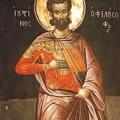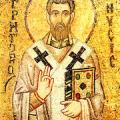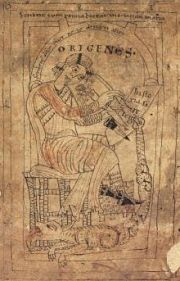103 - Fall and Rise: Origen
Origen, greatest of the Greek Church Fathers, sets out a stunning theory of human redemption as he marries philosophical rigor to theological speculation.
Themes:
Primary texts:
• Celsus, On the True Doctrine: a Discourse Against the Christians, trans. J.R. Hoffman (Oxford: 1987).
• Origen, On First Principles, trans. G.W. Butterworth (Gloucester MA: 1973).
• Origen, Contra Celsum [Against Celsus], trans. H. Chadwick (Cambridge: 1965).
Secondary literature:
• E.A. Clark, The Origenist Controversy (Princeton: 1992).
• H. Crouzel, Origen: The Life and Thought of the First Great Theologian, trans. A.S. Worrall (San Francisco: 1989).
• J. Daniélou, Origène (Paris: 1948).
• M.J. Edwards, Origen Against Plato (Aldershot: 2002).
• R.E. Heine and K.J. Torjeson (eds), The Oxford Handbook of Origen (Oxford: 2022).
• C. Kannengiesser and W.L. Peterson, Origen of Alexandria: His World and His Legacy (Notre Dame: 1988).
• J.W. Trigg, Origen (London: 1998).
Origeniana: Series of volumes with collected papers on Origen, now published by Peeters.







Comments
Origenal inspiration
Dear Peter,
Popped this onto my website (theunlicensedphilosopher.com) as direct result of your podcasts - is small indication of the sense of understanding you've given me re Christianity.
Many thanks.
DISHONEST SIMPLICITY: CHRISTIAN DECLINE?
Christians sometimes feel they must block their doubts to find faith.
But early Christian thinkers puzzled over the uncertainties, and saw their religion as intellectually superior to the philosophies of ancient Greece.
Why have Christians retreated into blind belief?
Did their leaders ignore the puzzles and tell a simple story because they thought people couldn't accept uncertainty?
And when inconsistencies emerged, did the leaders defend themselves by requiring faith in their stories, and not just faith that Jesus had revealed truth?
And did the dishonest simplification, and its dishonest defence, contribute to the beleaguered intellectual position of the church today?
In reply to Origenal inspiration by Alan Long
DISHONEST SIMPLICITY
Overly simplified Christianity seems to have contributed heavily to the decline of the Church in the West. Its growth in the 3rd world is destined to sputter out too as the 3rd world shrinks with ignorance and povery giving way to the perfect storm of technology, knowledge and critical thinking. In my opinion there are a few things that have to happen to turn the tide.
1. The Church would do well to admit when we are uncertain and refuse to divide over domatic speculation at the expense of the unity we are certain Jesus desires.
2. Embrace all objective truth as God's truth even if it trashes your theology. Truth wins.
3. Unite in visible and practice ways to solve humanities problems.
Not an exhaustive list, but they'd go a long way toward turning things around.
In reply to Origenal inspiration by Alan Long
Did Christians Retreat Into Blind Belief?
Alan, if you are still listening, hello.
I would like to address just one of your questions, not least because it occurs to many people, namely, “Why have Christians retreated into blind belief?”
I infer from your post that you assume such a retreat, in part, from a comparison of the thinking of Christians today - such as you know them – and early Christians such as Origen, Clement, Augustine and other Church Fathers and perhaps the likes of John Philoponus in the 6th century. If so, this would for me as an historian be akin to studying the kings and queens of England and concluding that one then knew what it meant to be ‘English’, as if the lives of everyone else were irrelevant to this concept. I think one need be very careful here to distinguish between a Christian and a human response to the world. The notion of ‘blind belief’ might be easily attributed to anyone; Christians may often seem an easy target because the Christian faith and the Church possesses, broadly speaking, a well-defined system of belief and has had an enormous impact upon cultures around the world for two thousand years: in short, it is very prominent, but it is also very diverse.
‘Blind belief’: how many of us spend time identifying the assumptions that we hold of ourselves and of the world around us and ask, “Are those assumptions valid?” “What are they based upon?” And then, when we realize or suspect that we were in error, proceed to change or eliminate those assumptions? Very few of us, in my experience, behave in this way; we are more likely to believe we are right because, well, our friends think the same way or because it is what our parents taught us: though arguably it is not the best response, this is a normal human response to the world and was undoubtedly equally normal for early Christians too as they adopted in a simple way the new faith. Just as most humans are not intellectuals, most Christians are not theologians, not Origens or Augustines, but even they were men of their time.
On the other hand, the stereotype of the Middle Ages generally as a ‘Dark Age’ dominated by religious dogmatism is undermined by the arrival of Greek science and natural philosophy during the 12th and 13th centuries and the vigorous intellectual exchanges that followed between it and Christian theology. As historian Edward Grant points out, theologians themselves “. . . had a remarkable degree of intellectual freedom and, for the most part, did not allow their theology to hinder or obstruct enquiry into the structure and operation of the physical world . . . Biblical texts were not employed to ‘demonstrate’ scientific truths by blind appeal to divine authority” (Lindberg/Numbers 'God & Nature', p.69, 1986). Philosopher, naturalist, theologian and bishop, Albertus Magnus (c.1206-1280), tutor of Thomas Aquinas, is a fine example both of this intellectual freedom and intellectual rigor (see http://www2.nd.edu/Departments/Maritain/etext/albert.htm). So, Alan, did Christians retreat into blind belief and if so, when?
Origen
Peter, hi. I stumbled across your website only recently whilst studying John Philoponus, my principle source being the book, God & Nature by Lindberg and Numbers, which I have been revisiting. The context of my present studies has been the relationship between ‘science’ and Christianity in late Antiquity, including the nature of the encounter between Christian thought and pagan philosophies; your discussion of John Philoponus, especially with Richard Sarabji was most helpful here. Lindberg’s discussion also included Origen as an example of how open to pagan philosophy Christian thinkers could be to which his student Gregory Thaumaturgus (‘The Wonder Worker’ – thanks for that) testified. Lindberg’s discussion, however, left me somewhat unclear about what Origen actually taught; your account has helped to rectify that, but I have some questions: in fact, as you present it - and perhaps this is Origen’s fault - we are left with some puzzling gaps, which I find it difficult to believe that a man of Origen’s erudition would not have seen, gaps indeed that would have left him more vulnerable to attack. You said that on the subject of the inequality in the world Origen rejected the Gnostic notion that humanity was created unequal as this was inconsistent with a just God, but accepted the evidence of his own experience that we were born unequal. Instead he suggested that human beings were created equal, but only later became unequal as a result of their own foolish choices. It was also, however, as a result of these choices that originally immaterial souls became shrouded in physical bodies that in turn exhibited the inequalities that we see in the world. Where, however, did the physical bodies come from? God could not have created them because He would then be responsible for the inequalities in the world that Origen attributes to the intellectual failure and foolish choices of created beings. Furthermore, if the diversity of form in the world is the consequence of the different desires of the souls that God first created, then why would those souls all appear in bodies of the same form? Also, if it is only because of the foolishness of souls that a complex and varied Cosmos comes into being in the first place instead, as you say, of the immaterial community of souls first created by God does this not imply that God did not intend to create a physical universe? Does it not imply that it was the foolish souls who fell away from God that created that universe? This would be in the least paradoxical.
In reply to Origen by Ian
Origen and matter
That's a good question, but I think the answer is pretty simple and reasonably satisfying (or at least no less satisfying than the whole theory!), which is that God creates the bodies so that the souls have somewhere to "fall into." The physical world is created as a kind of testing ground or place for the souls to learn from their error, and return towards God. So it is actually a sign of God's generosity that he makes bodies. Without them we would have no way to begin the return to Him. This makes Origen different from Gnostics who actually thought that the physical world was a bad thing.
In reply to Origen and matter by Peter Adamson
Origen and the Creation of Physical Bodies
Peter, hi. The intention of Origen’s argument, as you present it, was to address the problem of inequality in beings created by a just and loving God, inequalities that Origen evidently viewed as unjust.
His solution, as noted, was to suggest that God created souls equal and alike (no soul was more gifted or more intelligent than another). This situation only changed when, because the love of many of those souls for God grew cold and they made foolish choices, they became encapsulated in physical bodies: it was these bodies that exhibited the inequalities that Origen sought to explain. To suggest Peter as you do that God would have created these bodies for the wayward souls to “fall into” would therefore appear to defeat the logic of Origen’s argument and his intention, namely, to remove from God any responsibility for the inequalities that he observed in humans. In addition, as you noted, God is ‘simple’ in nature, undifferentiated and “without any diversity, so that His effects cannot come from Him already possessing variety and diversity”, but this is precisely what physical bodies exhibit - human one’s in this case of course. Thus, for this reason also God could not be assumed to have created them. Indeed, Origen you tell us believed “. . . that the whole cosmos can be understood as the product of the soul’s fall and rise; it is only because of the foolishness of souls that a complex and varied cosmos comes about in the first place instead of the immaterial community of souls first created by God.” This ‘simple’ nature of God would appear then to logically place a constraint upon God’s creative power - although I am sure Origen would not have intended this - whilst somehow the diversity and complexity of the world is the direct result of fallen souls. In turn, as I suggested in my previous post, for Origen this physical world was not what God intended anymore than was its inequality.
In reply to Origen and the Creation of Physical Bodies by Ian
Inequality
Really I should go back to the texts to double-check all this but I believe the idea is that the inequality arises solely through the choices of the souls. If they had all chosen rightly and stayed true to God then there would be no need for bodies. Different souls choose differently (not just at first, but over their whole history, making lots of different choices as we do from day to day), and are assigned different bodies accordingly. As I say, the bodies are actually something God creates to enable the souls to return to Him, undoing the damage done through their original errors; they are emphatically not the cause of the original error.
In reply to Inequality by Peter Adamson
Origen
Peter, hello.
I apologize for the delay in replying. If you do double-check the texts I would be interested to know what you come up with. In the meantime there is another related issue that I wish to raise. You mentioned in your podcast Origen’s work the ‘Hexapla’, a massive comparative study of the translations of the Old Testament from Hebrew into Greek, which is now for the most part lost to us: this work included a copy of the Septuagint, the first translation of the Hebrew bible into Greek before the Christian era, so I must assume that Origen had access to texts of the first books of Genesis much as I can read them today in my RSV version of the Bible. If so, I find it difficult to imagine how Origen could have reconciled with the Genesis account of Creation his explanation of how inequality and diversity came into the world. According to Genesis, God created a diverse physical world, the heavens and the earth and all the life therein, including humans, and on the sixth day “. . . God saw everything that he made, and behold, it was very good” (RSV). Physical bodies, not least human ones, did not follow, but preceded what Christian tradition calls ‘The Fall’: this contradicts Origen’s account, as discussed above, whether God created the human bodies or not. Notably, concerning the traditional concept of ‘The Fall’ as a removal of Man and Woman from the garden of Eden due to their disobedience in eating from the tree of knowledge, the Biblical text, in fact, is clear that they were removed for a different reason: namely, “The Lord God said, ‘Behold, the man has become like one of us, knowing good and evil; lest he . . . take also of the tree of life, and eat, and live forever . . . the Lord God sent him forth from the garden of Eden . . .” (Genesis 3:22-23, RSV). (The reference to “us” here is interesting.) Thus, whilst Origen explains, in your account Peter - the only one I know - that humans fell away from God due to their foolish decisions, not necessarily disobedience, the Biblical text states that God “drove out the man” (3:24). Of course the Biblical text also only speaks of two humans in this context: did Origen perhaps regard these as symbols of the many?
In reply to Origen by Ian
Origen and the Bible
I think the basic answer to this is pretty clear, though one would have to go into much more detail regarding the specific passages you cite, looking at whether/how Origen deals with them. But the basic answer is that figurative interpretation of the Bible in philosophical contexts was well-established by this time. Remember that Philo of Alexandria, who pioneered this technique, is able to read Genesis in light of Plato's Timaeus (and vice-versa!) and what Origen is doing is influenced by his example and other Christians who were doing similar things. This is not to say that it wasn't controversial of course but Genesis and particular was a rich hunting-ground for symbolic readings already before Origen came along.
Another Atlantis candidate
I found that Origen in Contra Celsum is not happy about the 10000 years of Plato's cyclical view of history, whereas Celsus obviously refers directly to Plato's Timaeus in this case; Celsus without explicitly mentioning primeval Athens and Atlantis, yet with attributing such knowledge to the Egyptians absolutely exactly as done in Plato's Timaeus, including the Phaethon myth; it is very likely that for Celsus the Atlantis story was a true story. Thus, Origen could indeed be identical with the neoplatonist Origen, both united in denial of any material truth in the Plato's Atlantis story.
Origen vs. Celsus
Support for Celsus!
Origen
Picked up the book “Dominion” by Tom Holland. Just read about Origen and couldn’t remember if you had talked about him in your podcast 😳. So I came here to search and found it! So now I’ll have to give this edition another listen.
I’ve rarely given Philosophy a second thought in my life let alone the history of it but have really enjoyed (and enjoying) this podcast. By the way your puns are great!
Add new comment